PCI Ventures within the Penn Center for Innovation hosted a showcase last Thursday at the office and lab space Pennovation Works. Over a dozen companies that have connections to Pennovation, whether through the PCI Ventures accelerator or by keeping space at Pennovation Works, gathered to network and talk about their respective companies.
University of Pennsylvania spinout companies Ghost Robotics and FloBio also spoke to the room about their company growth, and FloBio CEO Jerri Ann Thatcher was presented with the 2022 CEO of the Year Award.
Following the evening’s theme of startup growth, Technical.ly asked five company leaders at the showcase about their advancements and challenges, and what advice they have for other early entrepreneurs. Here’s what they said.
Axonova Medical
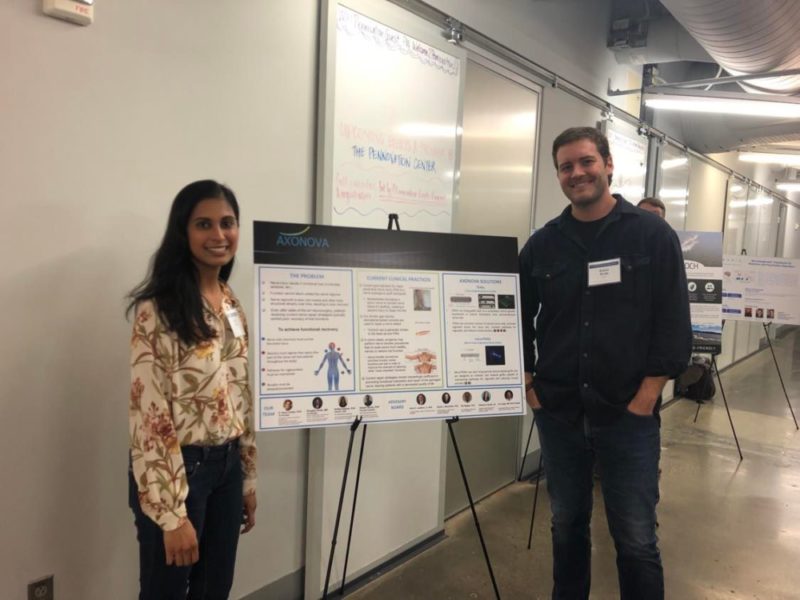
Kritika Katiyar and Robert Schultz from Axonova. (Photo by Sarah Huffman)
Axonova Medical is a biotech company working on treating peripheral nerve injuries. According to Kritika Katiyar, director of R&D, the company has made scientific advances with its nerve grafts over the last year. But Axonova has faced challenges partially due to the fact that there isn’t a lot of existing work with tissue engineering that it can reference. Katiyar said the company has valuable advisors that have helped it to navigate a less-understood field.
“They know the product, they know the market, they know their expertise is in different areas,” she said. Now, with the advisors’ help, “we kind of have to carve our own path forward because it is new.”
Katiyar’s advice is that there’s always a way to get things done, even if the answer is not obvious.
“Sometimes you just have to do it yourself,” she said. “It might seem like it’s extremely difficult, but it gets done and it gets done in a way that is very acceptable. If not, much better than acceptable.”
Baleena
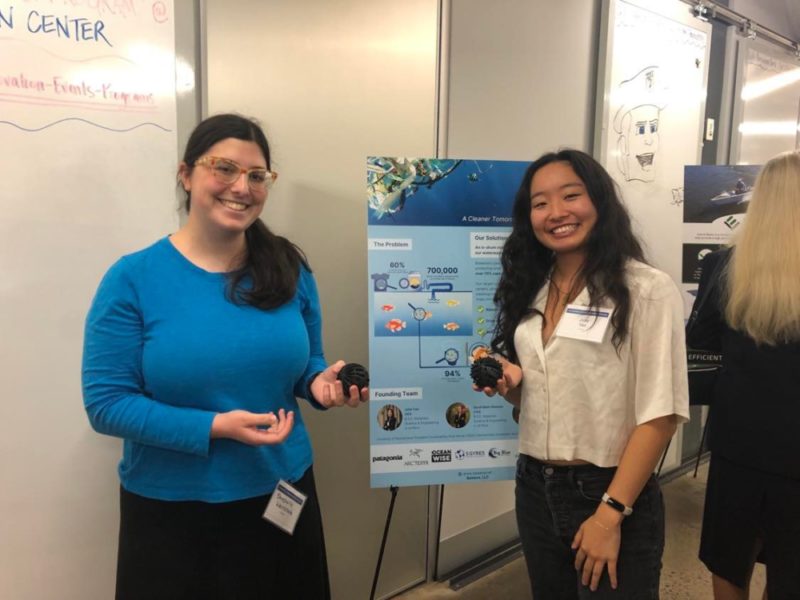
Shoshanna Weintraub and Emily Yan from Baleena. (Photo by Sarah Huffman)
Baleena, a company that makes a device to trap microfibers in washing machines, started only about six months ago, but has already grown significantly. Julia Yan, CEO of Baleena, said the company has done pitch competitions (including winning Pennovation’s 2022 pitch day) and been working on strategic partnerships. Shoshanna Weintraub, CTO, said the company has also been working on product development and setting up a lab.
Weintraub said starting up the lab has been a challenge because of all the equipment they need. Yet amid supply chain issues, they’ve had extra time to plan product development and set goals for their product.
Yan added that their team is made up of first-time entrepreneurs, and the last six months have been a huge learning opportunity.
Based on this experience, Weintraub said she would advise other entrepreneurs to not “get frustrated by all the hurdles and be open to pivoting and just waiting. Honestly, there are a lot of things that aren’t in your control, but it’ll all work out.”
Chip Diagnostics
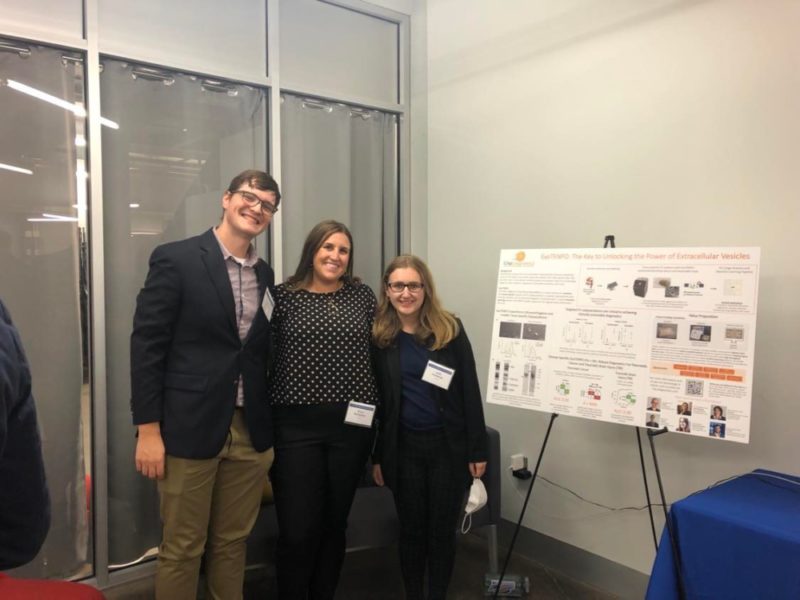
Will Brown, Erica Boetefuer and Julia Frederick from Chip Diagnostics. (Photo by Sarah Huffman)
Chip Diagnostics is working on “extracellular vesicle isolation technology and machine learning platform to enable diagnostics,” according to Erica Boetefuer Ph.D., head of biology. Boetefuer said in the last year, the company has doubled the size of its staff, including the hiring of mechanical engineer Will Brown and research associate Julia Frederick. However, the company has faced challenges raising funds — and with the science of extracellular vesicles.
“There are so many within the blood and we’re targeting a subpopulation, and there’s not good standards in the field,” Boetefuer said. “So we’re hoping that our technology enables some of these new discoveries.”
With these challenges, Brown said the company has learned to be resilient and believe in the work that it’s doing.
“We’re very lucky to have something really special here and we’re also very lucky to have a very good team,” he said. “So I think with those two things, you just kind of have to show up every day and then hope the funding comes through.”
Brown added that to any company just starting out, his advice is to enjoy the ride even through challenges. Frederick said her advice is to be open minded and willing to challenge yourself.
Epoch Boats
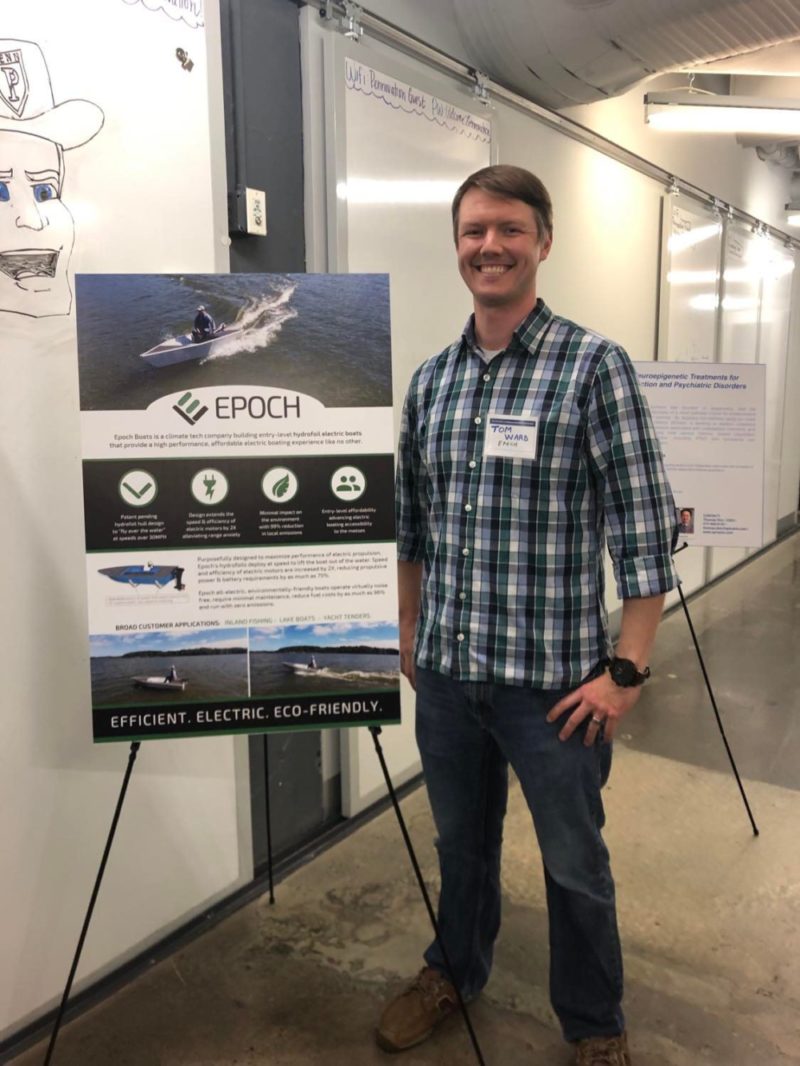
Tom Ward from Epoch Boats. (Photo by Sarah Huffman)
Epoch Boats, a company that makes hydrofoil electric boats, was just “an idea on paper” one year ago, according to CEO Tom Ward. Since then the company has worked on developing its technology, starting a waitlist for the boats and refining its story through working with Pennovation.
Ward said fundraising is always a challenge, but the effects of the pandemic also created supply chain issues.
“I think there are challenges that a lot of companies in this environment face, and we just do our best to circumvent them and mitigate them as much as we can,” he said.
Because of this, Ward said he’s learned to always have a backup plan to make navigating these issues easier. However, his ultimate advice for startups are to identify and talk to target customers from the very beginning: “Go find who your target customer is, and figure out what they truly want and make sure that it’s technically and physically possible to make that product — and then never stop talking to those customers.”
Vasowatch
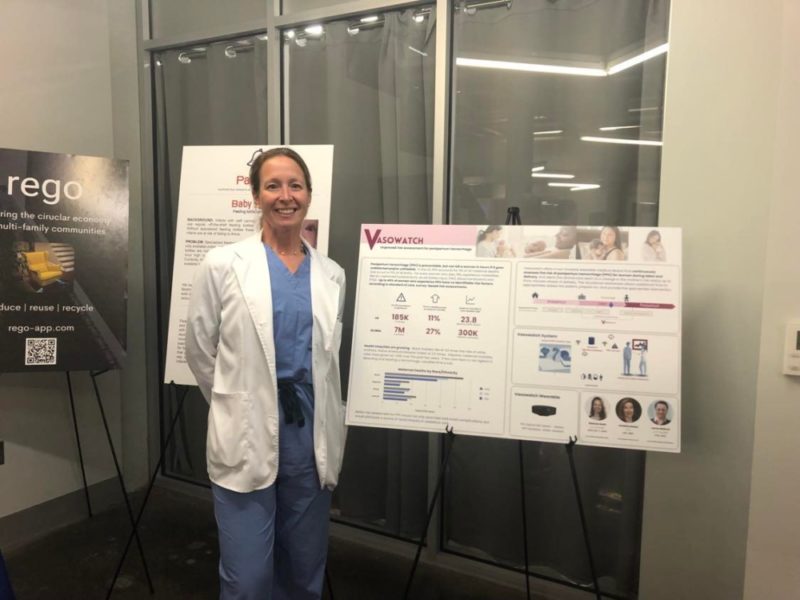
Stefanie Modri from Vasowatch. (Photo by Sarah Huffman)
Vasowatch is developing a wearable monitor to provide risk assessment of a postpartum hemorrhage in people who are giving birth. Cofounder Stefanie Modri said in the last year the company has brought on a CEO, won two grants and completed a patient study.
Modri said that as they’ve been working on the product, the company pivoted from detecting postpartum hemorrhage to risk assessment of it. She said healthcare professionals currently don’t have a great way to determine if someone is going to hemorrhage; they have a series of questions they ask, but the result is not always accurate. With this device, healthcare professionals can see who is more likely to hemorrhage and can better prepare to intervene.
The cofounder said it’s been challenging to balance the hours required to build a company on top of, in her case, working as a nurse and a nurse educator. But in the meantime, she’s learned to be OK with pivoting and bringing on people who have more expertise in business to help the company grow.
Her advice to entrepreneurs is to stay focused and to find a mentor — “even just someone you can just bounce ideas off of,” she said. “There are great people who are in wonderful positions to be a mentor and they feed off of … doing active connection work with someone else.”
Bonus!
A bonus piece of advice comes from Michael Poisel, executive director of PCI Ventures. He said entrepreneurs have to be dedicated and willing to put in a lot of time.
“You can’t give up at the small obstacles that are put in front of you and starting a company,” he said. “It’s like riding a roller coaster — it’s gonna be a lot of ups and downs, and you’ve got to stay as level as you can through the challenges.”
Sarah Huffman is a 2022-2024 corps member for Report for America, an initiative of The Groundtruth Project that pairs young journalists with local newsrooms. This position is supported by the Lenfest Institute for Journalism.Before you go...
Please consider supporting Technical.ly to keep our independent journalism strong. Unlike most business-focused media outlets, we don’t have a paywall. Instead, we count on your personal and organizational support.
3 ways to support our work:- Contribute to the Journalism Fund. Charitable giving ensures our information remains free and accessible for residents to discover workforce programs and entrepreneurship pathways. This includes philanthropic grants and individual tax-deductible donations from readers like you.
- Use our Preferred Partners. Our directory of vetted providers offers high-quality recommendations for services our readers need, and each referral supports our journalism.
- Use our services. If you need entrepreneurs and tech leaders to buy your services, are seeking technologists to hire or want more professionals to know about your ecosystem, Technical.ly has the biggest and most engaged audience in the mid-Atlantic. We help companies tell their stories and answer big questions to meet and serve our community.
Join our growing Slack community
Join 5,000 tech professionals and entrepreneurs in our community Slack today!

The person charged in the UnitedHealthcare CEO shooting had a ton of tech connections

From rejection to innovation: How I built a tool to beat AI hiring algorithms at their own game

Where are the country’s most vibrant tech and startup communities?



